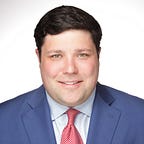Caregiving: the hot job of the future
Last year, Samuel Hammond, the Niskanen Center economist told me:
…humans will have an intrinsic comparative advantage when it comes to caring for other humans. Indeed, caring for children and the elderly may be some of the last remaining jobs humans are left to do once robots and AI have learned to do everything else.
We agree, and it has become our conviction that caregiving is one of the hot jobs of the future. Those of us who concern ourselves with the well-being, growth, and healthy development of children, as well as all of us bearing some responsibility for the systems that support children, should begin today to prepare the way for a future in which caregiving is both essentially and pragmatically a human endeavour. How can we prepare for this future?
One way is through innovation and adoption of public policies that meaningfully support caregiving in its various forms.
- Expansion of tax credits — some states, like Louisiana, have adopted a package of tax credits that provide tax breaks to child care workers and directors advancing along specific career or educational pathways and to families and businesses that support high-quality child care options. Tax-based incentives are a good way to encourage people to take up caregiving professions while encouraging continued professional development.
- Regulatory reform — while the safety and well-being of our children is of utmost importance and should be ensured through strong regulatory frameworks, it is critical to lower unnecessarily stringent regulatory barriers to entry into the caregiving fields. States should review requirements, with significant input from experts and the public, to verify that requirements are truly intended to safeguard children while ensuring high-quality care based upon the principle that children thrive in reciprocal, responsive relationships with caregivers. We should ensure that regulations are not principally geared towards protecting incumbent providers or squashing disruptive innovation by making it unnecessarily expensive or difficult to join caregiving fields or to innovate within them.
Another way is through catalyzing innovation and creativity within the professions responsible for the care of children so as to 1) ensure that they remain stimulating and creative fields in which to work, 2) encourage adaptability of the caregiving professions both to new entrants and to changing economic and social situations, and 3) foster long-term thinking that is responsive to changing conditions in the economy to meet the caregiving needs of the families in the future.
There are several exciting examples of emerging enterprises leading the way to the future of caregiving. I will highlight just two: Wonderschool and Wildflower Schools.
- Wonderschool is a network of boutique in-home early childhood programs that is helping more people open and run family child care centers. Their experiences in New York, San Francisco, and Los Angeles can teach the rest of us better ways to recruit, support, and retain new child care providers. Their model of support is ensuring that caregiving in the future can be flexible, independent, and well-supported.
- Wildflower Schools is a network of decentralized, Montessori micro-schools in shopfronts. They are intentionally blurring the boundaries between school and home thus creating unique environments that not only encourage healthy child development, but nurture the wellness, happiness, and capacities of caregivers.
Wonderschool and Wildflower represent a growing trend of innovations in early childhood that support better learning outcomes for children and a different, future-leaning approach to caregiving. There is more to be done, but if these innovations continue to grow as they have, we may indeed be standing on the threshold of a brighter future for caregiving and for kids.
